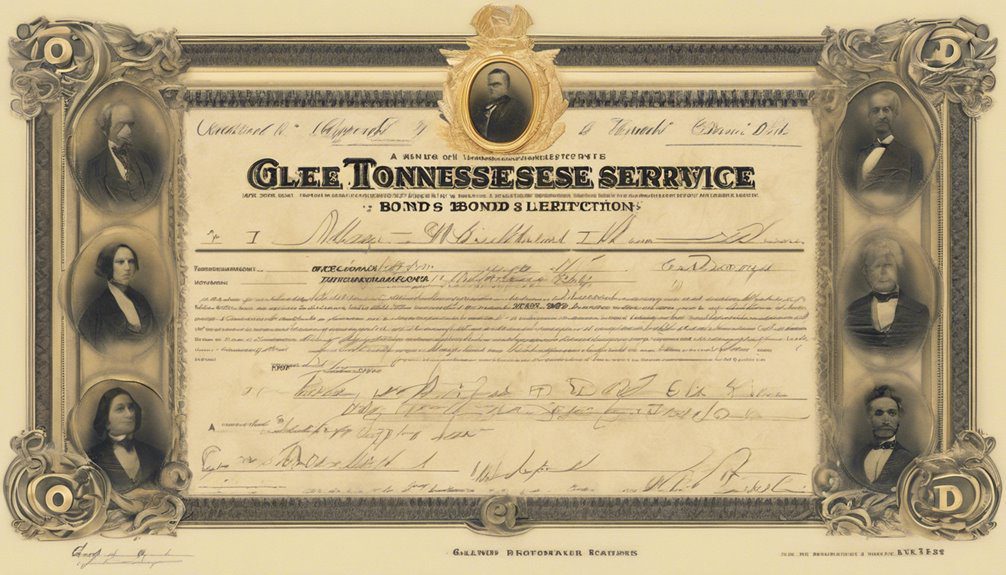If you're considering starting a collection agency in Tennessee, you need to understand the importance of the Tennessee Collection Service License Bond. This bond isn't just a formality; it's a crucial part of your commitment to ethical practices and compliance with state regulations. With amounts ranging from $10,000 to $100,000, it serves as a financial safety net for consumers and a testament to your agency's integrity. But what exactly does the application process entail, and how can it impact your business's future? Let's explore these key aspects further.
Overview of Collection License Bonds

What do you need to know about collection license bonds? These bonds are essential for businesses operating as collection agencies. They serve as a promise to adhere to state laws and regulations governing debt collection practices. Essentially, you're guaranteeing that you'll conduct your business ethically and responsibly, protecting both consumers and the integrity of the industry.
When you apply for a collection license bond in Tennessee, you'll need to provide specific documentation, including proof of your business's financial stability and compliance with local regulations. The bond amount typically varies based on your business model, but it generally ranges from $10,000 to $100,000.
Obtaining this bond involves working with a surety company, which assesses your creditworthiness and may require a premium based on your financial history. This premium is a small percentage of the bond amount and is paid annually. Compliance with bond requirements is crucial for establishing credibility and trust with clients and debtors.
Keep in mind that failure to comply with the bond's terms can lead to significant penalties, including financial losses and damage to your reputation.
Therefore, understanding the requirements and responsibilities tied to collection license bonds is crucial for your success in the debt collection industry.
Importance of the License Bond
The license bond plays a vital role in the debt collection industry, providing a safeguard for both agencies and consumers. By securing a bond, you demonstrate your commitment to ethical practices and compliance with state regulations. This not only builds trust among your clients but also helps establish your agency's credibility in a competitive market.
When you have a license bond, it acts as a financial safety net. If your agency engages in unethical behavior or violates regulations, consumers can file claims against the bond. This ensures that funds are available to compensate affected parties, thereby protecting consumers from potential losses.
Moreover, the bond acts as a deterrent against misconduct. Knowing that there's a financial consequence for unethical actions encourages you and your team to adhere to best practices and maintain professionalism.
In addition, many clients require proof of a license bond before they'll work with you. It can be a deciding factor in securing contracts and expanding your business. Furthermore, acquiring a bond helps ensure compliance with licensing laws, which is crucial for maintaining your operational license.
In essence, having a Tennessee collection service license bond isn't just a legal requirement; it's an essential investment in your agency's reputation and success.
Eligibility Requirements

To obtain a Tennessee collection service license bond, you'll need to meet specific eligibility requirements set by the state.
First, you must hold a valid collection service license issued by the Tennessee Collection Service Board. This involves passing a background check that assesses your criminal history, ensuring you haven't committed any fraud or dishonesty-related offenses.
You'll also need to demonstrate your financial responsibility. This usually means providing proof of current assets or financial statements that reflect your ability to manage a collection service responsibly.
Additionally, you'll have to provide details about your business structure, whether you're a sole proprietor, partnership, or corporation.
Furthermore, you should have a surety company ready to underwrite your bond. This company will evaluate your creditworthiness and overall financial health before issuing the bond.
Lastly, ensure you've completed any required pre-licensing education or training programs mandated by the state.
Application Process
Navigating the application process for a Tennessee collection service license bond involves several key steps.
First, you'll need to gather all necessary documentation, which typically includes your business license, financial statements, and proof of liability insurance. Make sure everything is current and accurate to avoid delays.
Next, complete the application form provided by the surety company. Be thorough and honest in your responses, as any discrepancies can lead to complications.
Once you've filled out the application, submit it along with the required documents.
After your application is submitted, the surety company will review your financial stability and credit history. This evaluation helps determine your eligibility for the bond and the terms that may apply.
Be prepared for potential follow-up questions, as the surety might request additional information to assess your application more thoroughly.
Once approved, you'll receive the bond agreement. Review it carefully before signing, ensuring that you understand all terms and conditions.
Bond Amounts and Costs

After securing your application for a Tennessee collection service license bond, it's important to understand the bond amounts and costs involved.
Typically, the bond amount you'll need to secure ranges from $10,000 to $50,000, depending on the specific requirements set by the state and your business's financial profile. This means you'll want to check the exact amount needed for your licensing process.
The cost of obtaining this bond isn't a flat fee; it varies based on factors such as your credit score and the bond amount.
Generally, you can expect to pay between 1% to 10% of the total bond amount as your premium. For instance, if your bond amount is set at $10,000 and your premium rate is 5%, you'll pay around $500.
It's essential to shop around and compare rates from different surety bond providers to find the best deal.
Some companies might offer lower rates based on your financial history or experience in the industry. Understanding these costs upfront will help you budget appropriately as you navigate the licensing process.
Duration and Renewal
Understanding the duration and renewal process for your Tennessee collection service license bond is crucial for maintaining compliance. Typically, these bonds are issued for a term of one year. You'll need to keep track of when your bond expires to avoid any lapses in coverage.
As the expiration date approaches, you'll want to initiate the renewal process. This usually involves contacting your surety bond provider well in advance. They may require updated information or documentation, so be prepared to submit any necessary paperwork.
The renewal fee may vary, depending on factors such as your credit score and the bond amount. Once you've completed the renewal process, make sure to keep a copy of your renewed bond on file. This ensures you can provide proof of coverage if requested by state authorities or clients.
If you fail to renew your bond on time, you risk losing your license and facing penalties. Regularly reviewing your bond status and maintaining open communication with your surety will help you stay on top of these requirements.
Ultimately, staying proactive about your bond's duration and renewal will safeguard your business and ensure ongoing compliance.
Compliance and Regulations

Compliance with regulations is essential for anyone operating a collection service in Tennessee. You must familiarize yourself with the state laws governing debt collection practices, which include the Fair Debt Collection Practices Act (FDCPA) and any local statutes. These laws outline what you can and can't do when collecting debts, ensuring that you treat consumers fairly and ethically.
You'll need to obtain the proper licensing before you start your operations. This process often involves submitting an application, providing proof of your surety bond, and paying the necessary fees. It's crucial to keep your license current and renew it on time, as operating without a valid license can lead to serious complications.
Additionally, maintaining accurate records of your collection activities is vital. You should document all interactions with debtors to comply with regulations and protect yourself from disputes.
Training your staff on these regulations ensures that everyone understands the legal framework and adheres to ethical collection practices.
Lastly, staying updated on any changes in laws or regulations is necessary. Regularly review industry guidelines to ensure your collection service remains compliant and avoids potential pitfalls.
Consequences of Non-Compliance
Failing to comply with regulations can lead to severe repercussions for your collection service. You may face hefty fines that can significantly impact your business's financial health.
If you're caught operating without a valid license, you risk losing your ability to conduct collections altogether, which could cripple your operations.
In addition to financial penalties, non-compliance can damage your reputation. Clients and customers expect ethical practices, and any violations can lead to distrust. This can result in lost business and a tarnished image in the community.
Moreover, persistent non-compliance may result in legal action against you. Regulatory bodies may initiate investigations that could lead to lawsuits or further sanctions. If your business is found to be in violation of laws, you might even face criminal charges, depending on the severity of the infraction.
Lastly, your bonding company could take action against you. They may revoke your bond, leaving you unable to operate legally.
Ultimately, the consequences of non-compliance can be dire, affecting not only your business but also your livelihood. It's crucial to stay informed and adhere to all regulations to avoid these pitfalls.
Resources for Further Information

To navigate the complexities of obtaining a Tennessee collection service license and maintaining compliance, it's essential to tap into reliable resources. Start by visiting the Tennessee Department of Commerce and Insurance website. They provide up-to-date information on licensing requirements, application processes, and regulations that govern collection services.
Another valuable resource is the National Association of Retail Collection Attorneys (NARCA), which offers best practices, legal updates, and networking opportunities. Joining professional organizations can also connect you with mentors who can guide you through the nuances of compliance.
You should also consider consulting legal professionals who specialize in collection services. They can offer tailored advice based on your specific circumstances and help you understand the legal landscape in Tennessee.
Additionally, local business associations often host workshops and seminars that cover licensing and compliance topics. These events can provide insights into industry standards and help you stay informed about changes in regulations.
Lastly, don't underestimate the power of online forums and social media groups. Engaging with peers in the industry can help you gather practical advice and share experiences, making your journey smoother.
Conclusion
In summary, the Tennessee Collection Service License Bond is essential for your agency's legitimacy and ethical practices. By securing this bond, you not only protect consumers but also enhance your credibility in the industry. Remember to meet eligibility requirements, navigate the application process, and stay compliant with regulations to avoid potential consequences. Staying informed and prepared will help you maintain your operational status and thrive in the competitive landscape of debt collection.


